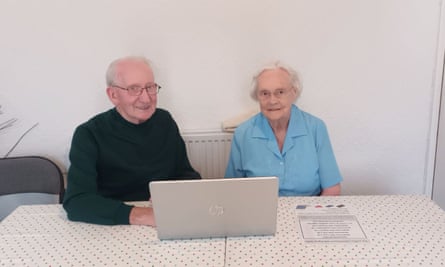
The government is allowing “millions of citizens to fall behind” due to digital exclusion, a House of Lords committee has warned.
As services move online at an “unprecedented” rate, the report by the Lords communications and digital committee found significant numbers lacked the means and skills needed to get online.
The cost of living crisis has exacerbated affordability issues, with up to 1 million people cutting off their broadband due to their finances, while half of people over 75 lacked basic digital skills.
‘Telecoms need to consider a single person discount’
Freya is among those who cannot afford broadband, meaning that setting up her own business in holistic health has been an uphill battle for the 31-year-old in West Yorkshire. “It’s a catch-22 – I need internet to get the business out there but can’t get internet until the business is [going].”
Freya, who lives alone, says she struggles with connectivity issues when using a mobile hotspot in her flat. “Signal is pretty bad so it’s a bit unreliable,” she says. “I’ve had video calls where it keeps cutting out – it’s obviously really disruptive.”
Otherwise, she is forced to use the local library for work. “It is not ideal to say the least – my library is no longer a quiet space so I have to contend with an absolute cacophony of voices, as well as people disturbing me and talking to me while I’m trying to work.”
She says setting up broadband would cost her at least £30 a month. “Telecoms really need to consider a single person discount. It would be different if I was sharing. It feels like everything is stacked against people who live alone.”
‘It feels like you can’t do anything’
People with physical or mental disabilities are disproportionately affected by the digital divide. Living on her own in Sussex, Sarah* said the main reason for not getting a computer or smartphone is her poor eyesight. “I’ve lost a lot of vision and my eyesight is not very good,” Sarah, who is 80, said. “I can’t watch TV or read for more than five minutes at a time so sitting in front of a screen all day sounds horrific.”
Along with disability problems such as difficulty walking, going to the shop to buy food or clothes can be a struggle. “Most people do their shopping online or have food delivered but I can’t do that – I go out once a week as that’s all I can manage. It definitely makes it harder to get things done in person.”
Most of her day is spent on the phone “trying to sort things out” such as discussing her energy bills with her supplier, or contacting the local council to move debris off the drain outside her house.
“I either get an answer phone or a robot and when I leave a message, nine times out of 10 they don’t get back to you. You just give up in the end.”
Sarah said she finds it “very hard” not having access to digital services. “It feels like you can’t do anything – like I don’t exist.
“I understand now that without it, you don’t live any more.”
skip past newsletter promotion
Sign up to First Edition
Free daily newsletter
Our morning email breaks down the key stories of the day, telling you what’s happening and why it matters
Enter your email address Enter your email address Sign upPrivacy Notice: Newsletters may contain info about charities, online ads, and content funded by outside parties. For more information see our Privacy Policy. We use Google reCaptcha to protect our website and the Google Privacy Policy and Terms of Service apply.
after newsletter promotion
‘My skills are very basic’
 View image in fullscreenJohn and Myra Nettleship. Photograph: Guardian Community
View image in fullscreenJohn and Myra Nettleship. Photograph: Guardian Community
Others are using services in their local area to help them develop their digital skills. John Leslie Nettleship and Myra Nettleship, both 88, have recently begun attending digital literacy sessions at the Learn for Life hub in Sheffield, which is part of the Good Things Foundation charity’s network, to learn how to use their new laptop after their desktop computer stopped working.
“We bought a laptop but need to know how to use it – it’s very different,” he says. “It still works on the Windows system but it was set up for us by our son who understands these things better.”
The couple have online banking and occasionally do online shopping on sites like eBay. Nettleship explains that he recently had to rely on his son to check if a standing order had been cancelled on time. “I suspected we may still be paying for something that was no longer required. If we had [the skills], we would have been able to do it ourselves.”
Nettleship belongs to a writers’ club and says he mainly uses the laptop for writing stories. “Once a fortnight we write pieces and send them to each other. I’ve been in it for 20 years now but we only recently started to exchange emails since the Covid lockdowns.”
“My skills are very basic – “I can really just about find my way round the keyboard. “It takes me half a day to type up one A4 sheet of a story. I just want to become more familiar with the laptop and be able to use it without too much hard thinking.”
*Name has been changed
